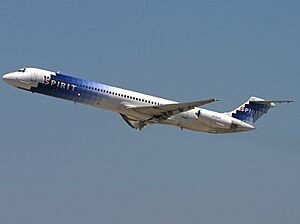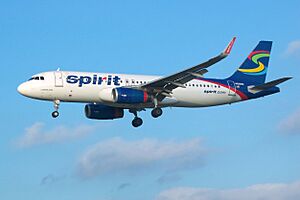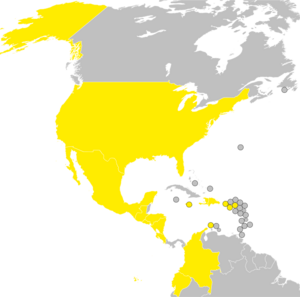Spirit Airlines facts for kids

A Spirit Airlines Airbus A320neo
|
|
| Founded | 1983 (as Charter One Airlines) |
|---|---|
| Commenced operations |
|
| AOC # | GTIA770S |
| Operating bases | |
| Frequent-flyer program | Free Spirit |
| Fleet size | 195 |
| Destinations | 88 |
| Headquarters | Dania Beach, Florida, U.S. |
| Key people | Dave Davis (President & CEO) |
| Revenue | |
| Operating income | ▲ US$-1.1 billion (2024) |
| Net income | ▲ US$-1.2 billion (2024) |
| Total assets | |
| Total equity | |
| Employees | |
Spirit Airlines, Inc. is an American ultra-low cost airline. This means it offers very low ticket prices. However, it charges extra for things like choosing your seat or bringing a carry-on bag. Spirit's main office is in Dania Beach, Florida.
The airline flies to many places. These include cities across the United States, the Caribbean, and Latin America. In 2023, Spirit was the seventh largest passenger airline in North America. It was also the biggest ultra-low-cost airline. Spirit went through a financial reorganization in late 2024. It successfully completed this process in March 2025.
Contents
Spirit Airlines: A Look at Its History
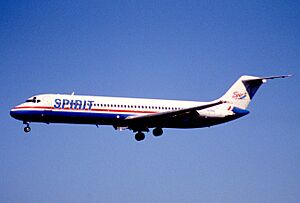
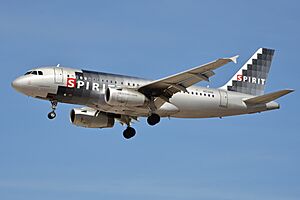
How Spirit Airlines Started
The company began in 1964 as Clippert Trucking Company. It later changed its name to Ground Air Transfer, Inc. In 1983, Ned Homfeld started an airline service. It was called Charter One Airlines. This company offered travel packages to fun places. These included Atlantic City, Las Vegas, and the Bahamas.
Growth and Changes in the 1990s
In May 1992, Charter One Airlines started using jet aircraft. It also changed its name to Spirit Airlines. The first scheduled flights began in June 1992. They flew between Detroit and Atlantic City. Soon after, flights started between Boston and Providence.
Spirit Airlines grew quickly. In April 1993, it added flights to Orlando, Fort Lauderdale, and St. Petersburg, Florida. By 1994, service began in Philadelphia. Over the next five years, Spirit added more flights. It also started flying to new cities. These included Myrtle Beach, Los Angeles, and New York City.
In 1994, Spirit Airlines had a problem. They accidentally sold too many tickets. About 1,400 customers had their flights canceled. Spirit Airlines promised to fix this. They said all paid customers would always fly. If needed, Spirit would even book them on another airline.
In 1996, Janet Patton became Spirit's first female pilot. By 1998, she became the first female captain. At this time, Spirit used DC-9 and MD-80 planes. In 1999, Spirit moved its main office to Miramar, Florida.
Spirit Airlines in the 2000s
In 2001, Spirit began flights to San Juan, Puerto Rico. They also created a Spanish-language customer service plan. This included a website and a special phone line. In 2003, Spirit restarted flights to Ronald Reagan Washington National Airport in Washington, D.C. These flights had stopped after the September 11 attacks.
Spirit added more destinations in 2006. These included Grand Cayman, San Francisco, and Boston. In 2007, Spirit applied to fly to Costa Rica, Haiti, and Venezuela.
Ben Baldanza became Spirit's President in 2005. His goal was to make the company profitable. In 2006, he became CEO. He changed Spirit into an ultra-low-cost airline. Spirit also ordered 30 new Airbus A320-200 planes in 2006.
In 2009, Spirit pilots voted to go on strike. They wanted better pay and benefits. On June 12, 2010, the pilots went on strike. This stopped all Spirit flights. After a few days, they reached an agreement. Flights started again on June 18. Spirit pilots then had pay and benefits similar to other Airbus pilots in the U.S.
Spirit Plus, a business class service, changed its name to "Big Front Seat" in 2007. For an extra fee, passengers could choose these larger seats.
Spirit Airlines in the 2010s
In April 2010, Spirit Airlines started charging for carry-on bags. It was the first U.S. airline to do this. Other airlines like Allegiant Air and Frontier Airlines later did the same.
In 2012, Spirit faced criticism. They initially refused to refund a sick military veteran's ticket. The CEO, Ben Baldanza, later apologized. He personally refunded the ticket. Spirit also donated $5,000 to a charity for veterans.
In 2016, Robert L. Fornaro became the new CEO. He announced that Spirit would work with the Disney Institute. This was to improve customer service. By November 2017, Spirit's on-time performance was much better. It was second only to Delta Air Lines. In February 2018, Spirit was named one of the top 10 safest airlines worldwide.
Spirit also added high-speed WiFi to its planes. This started in late 2018. By summer 2019, all planes had WiFi. In October 2019, Spirit announced plans to move its main office. The new headquarters would be in Dania Beach, Florida. It opened in April 2024.
Spirit Airlines in the 2020s
In 2020, the COVID-19 pandemic affected air travel. Spirit Airlines received government aid to help pay its employees. In July 2020, a passenger died of COVID-19 on a Spirit flight. Spirit said it told health officials, but records were unclear.
In 2022, Spirit upgraded its in-flight internet. It now offers very fast Wi-Fi. This is thanks to a new satellite. In August 2023, Spirit changed an order for smaller planes. They decided to buy larger Airbus A321neo planes instead.
In January 2025, Spirit Airlines added new routes. They also brought back some seasonal flights for spring break. On January 16, 2025, Spirit laid off 200 employees to save money. On January 24, 2025, Spirit updated its dress code. Passengers can now be denied boarding for inappropriate clothing or offensive tattoos.
On April 17, 2025, Spirit successfully completed its financial reorganization. Dave Davis became the new CEO on April 21, 2025.
Mergers and Financial Restructuring
In February 2022, Frontier Airlines wanted to buy Spirit. Spirit's shareholders rejected this offer in July 2022. Then, JetBlue offered to buy Spirit. Spirit's board first said no. They worried that the government would block the deal. They thought it might lead to higher ticket prices for customers.
However, in July 2022, JetBlue and Spirit agreed on a deal. Spirit shareholders approved it. But the U.S. Department of Justice sued to stop the merger. They said it would harm customers. In January 2024, a judge blocked the deal. The judge agreed it would reduce competition. Spirit's stock price dropped a lot after this. JetBlue ended its plan to buy Spirit in March 2024.
In November 2024, Spirit announced it was preparing for financial restructuring. On November 18, 2024, Spirit Airlines officially filed for this. The company said it was due to losses, failed merger attempts, and high competition. Spirit continued to fly during this time. It successfully completed its financial restructuring in March 2025. As a result, Spirit Airlines was no longer traded on the New York Stock Exchange.
In January 2025, Frontier Airlines again offered to buy Spirit. Spirit rejected this new offer. However, Spirit said it was open to more talks with Frontier.
How Spirit Airlines Operates
| Year | Revenue, in million US$ |
Net profit/(loss), in million US$ |
Employees (FTE) |
Passengers (m) |
Passenger load factor (%) | Aircraft |
|---|---|---|---|---|---|---|
| 2014 | 1,932 | 225 | 3,722 | 14.3 | 86.7 | 65 |
| 2015 | 2,141 | 317 | 4,326 | 17.9 | 84.7 | 79 |
| 2016 | 2,320 | 263 | 5,159 | 21.6 | 84.7 | 95 |
| 2017 | 2,644 | 416 | 6,100 | 24.2 | 83.1 | 112 |
| 2018 | 3,323 | 156 | 7,110 | 29.3 | 83.9 | 128 |
| 2019 | 3,831 | 335 | 8,938 | 34.5 | 84.4 | 145 |
| 2020 | 1,810 | (429) | 8,756 | 18.4 | 69.7 | 157 |
| 2021 | 3,230 | (473) | 9,218 | 30.8 | 78.8 | 173 |
| 2022 | 5,068 | (554) | 11,107 | 38.5 | 81.9 | 194 |
| 2023 | 5,362 | (447) | 12,798 | 44.1 | 81.3 | 205 |
| 2024 | 4,812 | (1,230) | 11,331 | 44.2 | 82.4 | 213 |
Spirit's Business Model
Spirit Airlines uses an "ultra-low-cost" business model. This means they charge a very low price for the basic ticket. But they charge extra fees for things that other airlines might include. For example, you pay extra for carry-on bags or choosing your seat. This helps Spirit earn more money from these extra services.
Frequent Flyer Program
Spirit Airlines has a program for frequent flyers. It is called Free Spirit. It has three different levels.
Customer Concerns and Actions
Spirit Airlines has received many complaints. The U.S. Department of Transportation (DOT) has also taken action against them. Most complaints were about advertising and extra fees.
- In 2011, the DOT fined Spirit for advertising low fares. The ads did not clearly show all the extra fees.
- In 2012, Spirit was fined for not handling complaints well. These complaints were from customers with disabilities.
- In 2013 and 2015, Spirit received more passenger complaints than any other airline.
- In 2018, a passenger flushed her hamster down an airport toilet. This happened after Spirit would not let her take the hamster on the flight. She said a Spirit employee told her she could bring the animal.
- In August 2021, Spirit canceled many flights. This left many travelers stuck. Spirit said it was due to weather and other problems.
- In June 2023, a passenger was denied bathroom access for a long time. She ended up having to urinate on the floor of the plane.
Where Spirit Airlines Flies
Spirit flies to 83 places. These include cities in Central America, the Caribbean, South America, and the United States. Spirit has crew bases in many major airports. These include Atlanta, Chicago–O'Hare, Dallas/Fort Worth, Detroit, Fort Lauderdale, Houston–Intercontinental, Las Vegas, Miami, Newark, and Orlando.
Partner Airlines
Spirit has agreements with other airlines. These are called Interline agreements. They help passengers connect to more places. Spirit works with:
- French Bee
- Norse Atlantic Airways
- Play
Spirit Airlines: Its Fleet of Planes
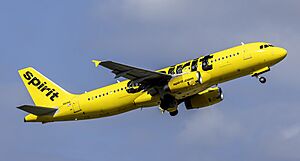
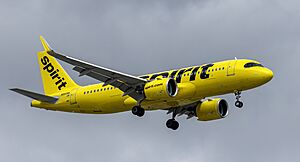
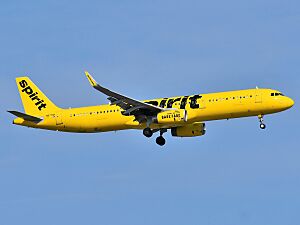
Current Aircraft
As of June 2025, Spirit Airlines uses only Airbus A320 family planes. Here are the types of aircraft they have:
| Aircraft | In service | Orders | Passengers | |||
|---|---|---|---|---|---|---|
| C | P | Y | Total | |||
| Airbus A320-200 | 50 | — | 8 | 12 | 156 | 176 |
| Airbus A320neo | 91 | 23 | ||||
| Airbus A321-200 | 22 | — | 8 | 12 | 202 | 222 |
| Airbus A321neo | 32 | 29 | 8 | 12 | 209 | 229 |
| Total | 195 | 52 | ||||
Past Aircraft
Spirit Airlines has used these types of planes in the past:
| Aircraft | Total | Introduced | Retired | Replacement |
|---|---|---|---|---|
| Airbus A319-100 | 35 | 2005 | 2025 | Airbus A320neo family |
| McDonnell Douglas DC-9-20 | 3 | 1995 | 1997 | None |
| McDonnell Douglas DC-9-30 | 13 | 1992 | 2003 | McDonnell Douglas MD-80 |
| McDonnell Douglas DC-9-40 | 2 | 1996 | ||
| McDonnell Douglas MD-81 | 6 | 1999 | 2005 | Airbus A320 family |
| McDonnell Douglas MD-82 | 15 | 1997 | 2007 | |
| McDonnell Douglas MD-83 | 15 | 1998 | 2010 | |
| McDonnell Douglas MD-87 | 1 | 2003 |
Incidents and Safety
- July 17, 2015 – Spirit Airlines Flight 708 had a fume event. This happened while landing in Boston. Both pilots got sick. The captain later passed away.
- October 2, 2021 – Spirit Airlines Flight 3044 hit a bird. This happened during takeoff from Atlantic City International Airport. The pilots stopped the takeoff safely. Four people had minor injuries while leaving the plane.
- July 10, 2022 – Spirit Airlines Flight 383 had overheated brakes. This caused a brief fire after landing in Atlanta. No one on board was hurt.
- March 1, 2023 – Spirit Airlines Flight 259 had a battery fire. A lithium-ion battery caught fire in an overhead bin. The plane had to land early in Jacksonville, Florida. Ten passengers went to the hospital with minor issues.
- November 11, 2024 – Spirit Airlines Flight 951 was hit by bullets. This happened while landing in Port-au-Prince, Haiti. A flight attendant was slightly injured. The flight then went to the Dominican Republic.
See also
 In Spanish: Spirit Airlines para niños
In Spanish: Spirit Airlines para niños
- Air transportation in the United States


